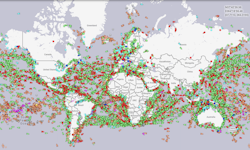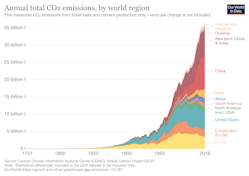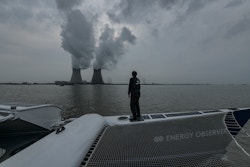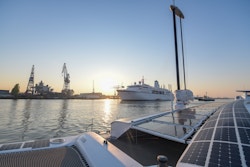World Maritime Day: for more sustainable shipping
“Sustainable shipping for a sustainable planet”: with 80% of the global trade being transported by ships, the stakes for 2020 World Maritime Day are high. Nothing less of the survival of our marine ecosystem.
As many ships as fish in the ocean
Our oceans are filling up with ships. Today, the world commercial fleet consists of approximately 95 000 vessels, with a combined weight of 1.92 billion dead-weight tonnage (weight while empty). Dry bulk carriers, which carry iron ore, coal, grain and other cargo, account for the largest share of total tonnage at over 40%.
They are followed by oil tankers at 30% and container ships at 13%. To give an idea of what 1.92 billion tonnes represent, the biomass of all the fish in the ocean is estimated at 2 billion tonnes. And this number is of empty merchandise ships, it does not account for the cargo they carry or all other types of vessels (fishing, military, recreation, tourism etc.).

Live view of marine traffic
Today, it is estimated that, by weight, there is as much vessels as there is fish in the oceans.
This global commercial fleet carries 10.7 billion tons of freight every year, representing 80% of total world trade by volume. To achieve such a feat, vessels have become larger, more numerous and are crossing our oceans at an ever-growing speed. The intensification of maritime traffic generates a considerable impact on the marine ecosystems.
Up to 3.5% of global CO2 emissions
The first of these impact is the emission of greenhouse gases in the atmosphere. Greenhouse gases are responsible for global warming. Simply put, these gases allow solar radiations to enter the atmosphere but prevent infrared radiation (heat) from leaving. This extra thermal energy is kept close to the earth surface by the gases, which warms the atmosphere and modifies the climate.

Annual CO2 emissions in the world
On average, total shipping fuel consumption is estimated between 250 and 300 million tonnes per year. This massive fossil fuel consumption emits a total of 932 million tonnes of CO2 every year, an estimated 2.5 to 3.5% of the total CO2 emissions on the planet. If international shipping was treated as a country, it would be the 6th largest emitter of CO2 in the world, after the United States, China, Russia, India and Japan.
Impact on air quality
A second important impact is the release of sulphur and nitrogen oxides (NOx and SOx) in the atmosphere. These compounds are released when fuel is combusted, and they have adverse effects on air quality. Sulphur oxides transform into sulphuric acids in contact with water and are responsible for soil and river acidifications, leading to forest degradation and fresh water system pollution.

Petrochemical industry in Antwerp
Nitrogen oxides are important contributors to tropospheric ozone layer, a low laying air pollution also called “smog” that has detrimental effects on human health. Around 15% of global anthropogenic NOx and 8% of global SOx emissions are attributed to oceangoing ships, but these numbers can increase in coastal areas or around major ports. In the Netherlands, up to 24% of NOx in the atmosphere come from ships, contributing massively to air quality degradation. These oxides mainly cause respiratory conditions such as inflammation of the airways, decreased lung function and increased allergic responses. Long term exposure can cause asthma and respiratory infections.
Another impact of shipping, often less discussed, is underwater noise pollution. It can have significant impact on marine species and you can find a detailed article on the subject.
Shipping energy transition
While marine ecosystems have recently experienced a rest due to the slowing of maritime traffic as a result of the COVID crisis, it is crucial to find long-term solutions for a more sustainable international shipping, from a technology and a regulation standpoint.
The new technologies developed on Energy Observer are a first alternative to fossil fuels: mix sources of renewable energies and an on-board hydrogen production line, to guarantee a total autonomy over long distances and without any emission of pollutants or noise. The industrialisation of these energetic models is now being promoted by massive public investments in green hydrogen, notably in France and the rest of Europe.
Another alternative to fossil fuels available at large scale on cargo ships is liquefied natural gas (LNG), which decreases CO2 emissions by 20%, sulphur oxides by 99% and nitrogen oxides by 85% compared to traditional combustion systems. CMA CGM announced recently the launch of a new fleet running on LNG to preserve air quality and reduce their activity footprint on the oceans.
Regulations and legislations around maritime transports are also essential for a sustainable energy transition. A short-term solution is the regulation of ship speed (France has recently requested such a regulation to the International Maritime Organisation) in order to reduce fuel consumption, and thus CO2 emission, and avoid collisions with marine mammals. The creation a regulatory framework around hydrogen usage on the sea will also encourage and regulate its commercialization and facilitate the shift towards non-polluting sources of energy.

In the port of Amsterdam
A necessary industry and an essential switch
Shipping is often viewed as the most cost-effective, safe and ecologic transport method, especially when calculations are based on the economic and ecologic impact by tonne of cargo carried. The COVID-19 pandemic also highlighted the necessity of such an industry, as millions of seafarers continued to serve the world’s economy, transport vital medical supplies, food and other basic goods critical for the pandemic response. Being an essential pillar of our economy, we need the shipping industry to be prosperous, however, an energetic shift towards green, sustainable energy source is crucial. We need to find ways to halt pollution and CO2 emissions now, and the technologies to do so are already available to us.
There is no economy possible on a dead planet.
Let’s make the change today.